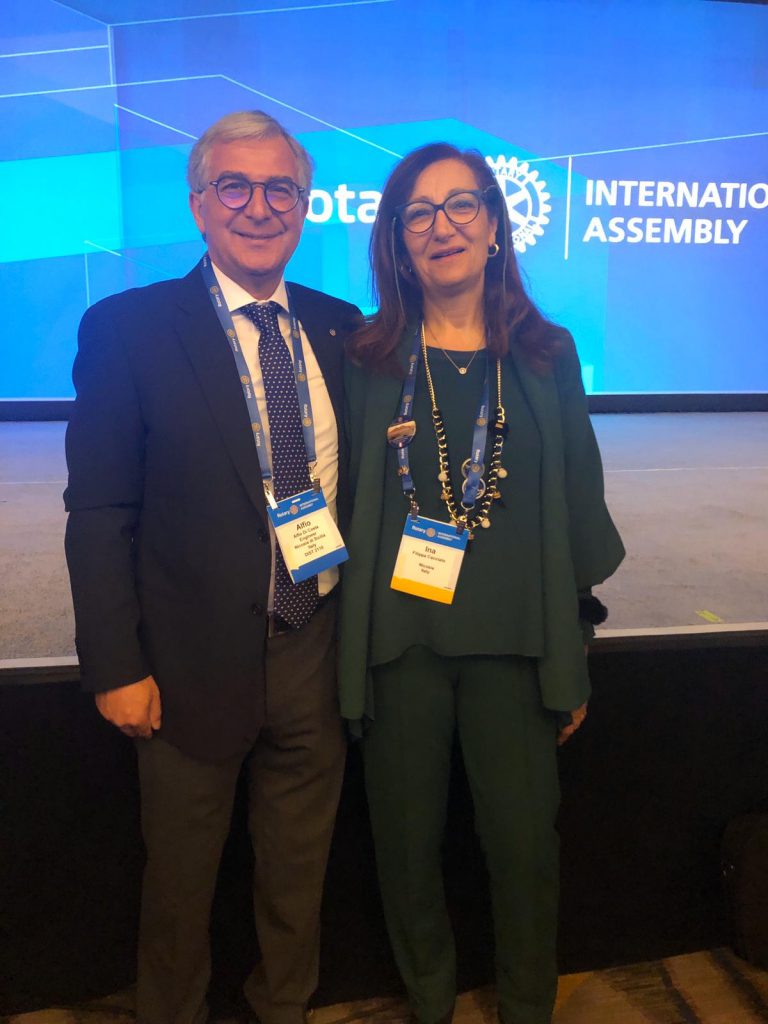 Dear friends,
Dear friends,each month of this precious Rotarian calendar allows me and allows us to focus on some appreciated characterizations of our commitment, both external, towards territories and communities, and internal. The “Month of water, sanitation and hygiene”, of absolute priority and centrality in this historical moment, pays attention to the fact that water, becoming rare and precious, could lead the part of the world that needs it to give it a value so high that it sometimes exceeds that of oil.
Difficult, sometimes absent, access to drinking water leads to an exponential growth of diseases related to the lack of it. Worldwide, more than one and a half billion people do not have access to drinking water. In many developing countries, large numbers of children perish every day; all, of course, for a number of diseases related to the lack of drinking or cleaning water and for the effects of what are called water diseases. Currently, the WHO indicates 25 “water” diseases generated by ingestion, by the proximity or proximity to unhealthy water and by the absence of cleaning. Allow me a quote: “Praised be you, my lord, for Sister Water, which is very useful and humble and precious and chaste” (St. Francis of Assisi). Therefore, “sister water” and sanitation undoubtedly remain two interrelated topics and legitimately Rotary International considers them as one in their annual calendar. Rotary, let us not forget, adheres to the “World Water Day”, which the United Nations Organization, in the not too distant 1992, established, foreseeing that it would take place every 22 March in the world. Water is the essential element for life on our planet, it is a precious commodity not to be wasted. But, it’s only valuable if it’s not polluted. The surface of our planet is occupied for more than 70% by water but, nevertheless, man has always had to face the problem of its supply in order to guarantee survival. The growth of human civilization has always been, we can say, subordinated to the opportunity of being able to count on the possibility of using water (regardless of the rains, more or less vigorous, linked to the seasons) thanks to the presence of natural above-ground reservoirs (rivers and lakes) or underground and, above all, on its quality and usability. In fact, polluted water is not life. The limited possibility of exploiting water has always been a decisive factor in marginalizing growth and sanctioning the disappearance of many civilizations, especially in those areas, today, characterized by uncontrollable desertification. For these considerations expressed, it is clear and natural that Rotary International works tirelessly to ensure the health and potability of the planet’s waters, especially in those areas where it is scarce or heavily polluted. Let us never forget that 60% of water resources are collected in just nine countries while more than 80 are those who suffer permanently, even in the very short seasons of rain, of water poverty. Nearly one billion people in the world consume 86% of usable water resources; two billion individuals on the planet, on the other hand, due to the often total absence of drinking water, concentrate more than 90% of the causes of disease on its territory. The real problem for humanity does not lie in the total quantity of drinking water on the planet, but in its accessibility and usability for human use; as well as in the rampant poverty that exacerbates and, at times, makes the question unsolvable. On the other hand, the fact is evident that even if you live in the driest desert and have the economic availability, you will still have stable, easy and lasting access to water, while those who do not have this availability cannot have access, not even in the Amazon where water is undoubtedly abundant. Therefore, according to these premises, Rotary places the management of water and water resources among the highest priorities in the project actions carried out by Rotarians in all areas of the world and, among these, also in our District 2110. Rotary International believes that the human tragedy we have before our eyes should be an inflexible warning for all of us members: the construction of wells, cisterns for the collection of water, the purification of some waterways and lakes, and services sanitation must be a priority to any other action. Without water, life itself would be and is, in fact, impossible. Alongside those who are dying of thirst, there are millions of our brothers, in many areas of the world, who, unfortunately, are dying from diseases related to the lack of water and which are absolutely predictable. It is on this consideration that our District, our Clubs, even individual members of them, must consider themselves committed to providing the communities around the world with sanitary facilities and starting other projects in the water sector in each, without exception, of the Countries very slow, sometimes non-existent, development. We must commit resources, building partnerships and investing in facilities and training projects that must lead to long-term transformations. It is, for us, an opportunity that we cannot miss. It takes commitment, determination, courage. Ideas and projects are needed. We serve us with our enthusiasm and our desire to affect the growth process of all humanity. The district committees, our clubs and many members are working towards this, even starting from some marginalized realities of our big cities.
Let’s believe it all the way.
With love
Alfio
Let’s believe it all the way.
With love
Alfio